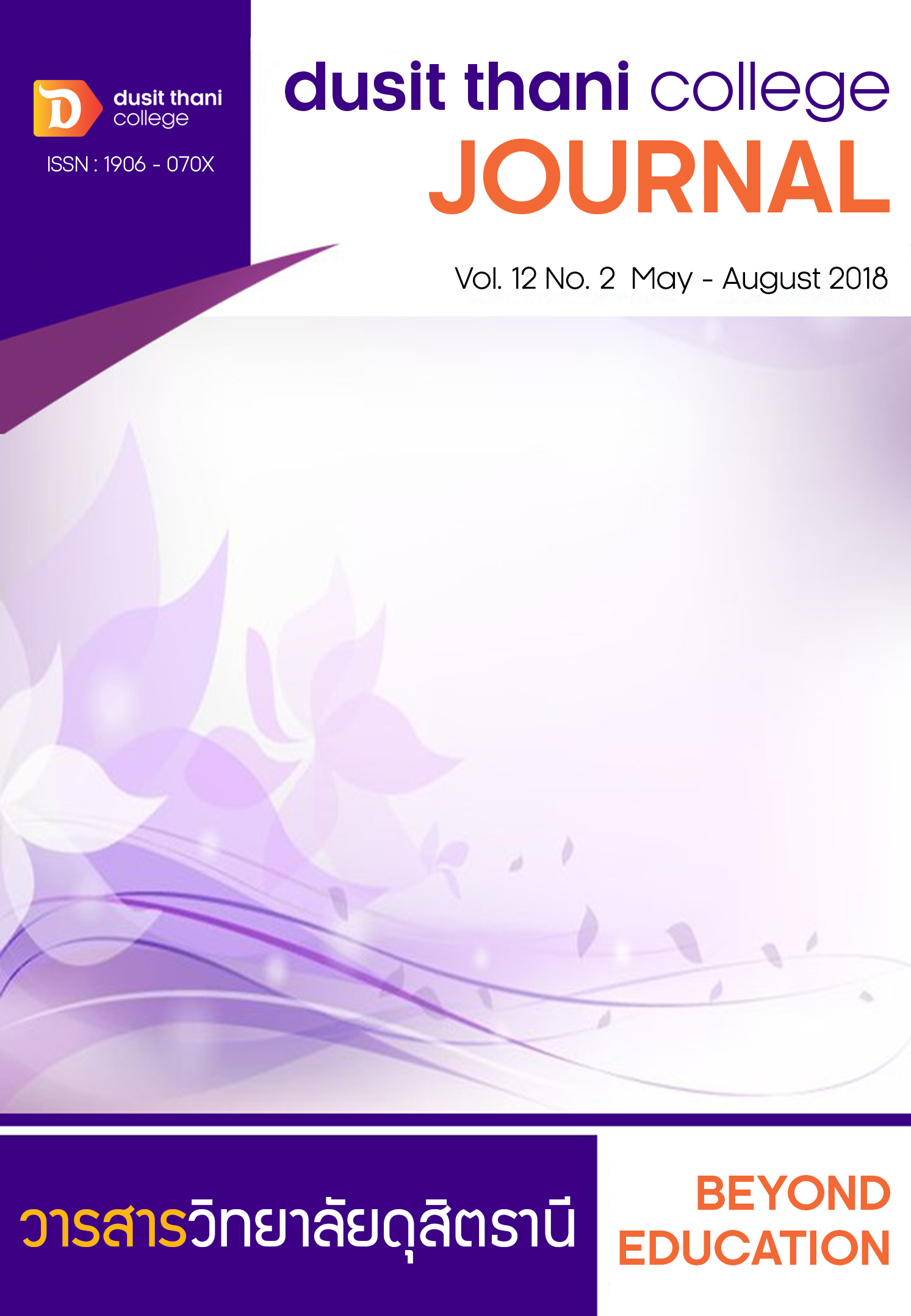Developing an Extend Theory of Planned Behavior Model to Examine Thai Consumer Response Toward Thai Green Hotels
Main Article Content
Abstract
This research describes the use of the extended theory of planned behavior (TPB) research model which included perceived value (hedonic and utilitarian value) to explaining characteristics of Thai consumers with hotel experience. The objectives include: 1) to examine Thai consumer perceptions and attitudes toward green hotels; and 2) to examine existing consumer behaviors toward green hotels; and 3) to determine the impact of an extended Theory of Planned Behavior (TPB) (including green attitudes, subjective norms, perceived behavioral control, and hotel perceived value) on consumer response; and 4) to provide recommendations based on the primary study and literature review to improve green hotel services in Thailand. The results of the study on the structural equation model (SEM) using a sample of 385 people who stayed at a green hotel in Thailand found that Thai people are aware of the value received. (Value of happiness and benefits) in response to Thai green hotel as expected. In terms of attitude toward green, subjective norm and the perceived behavior control Thai consumers are not as important as they should be. This finding suggests that the development of extended theory of planned behavior (TPB), which includes the perceived value (hedonic and utilitarian value) can be used to measure and understand the response of Thai consumers to green hotels in Thailand.
Article Details
Article Screening Policy
- All research and academic articles to be published must be considered and screened by three peer reviews in the relevant field / article.
- All articles, texts, illustrations and tables published in the journal are the personal opinions of the authors. Editors don't always have to agree. And no responsibility whatsoever is the sole responsibility of the author.
- The articles to be published must never be published. Where did you first publish? And not in the consideration of other journals If the audit found that there has been a duplicate publication It is the sole responsibility of the author.
- Any article that the reader sees as being plagiarized or impersonated without reference. Or mislead the work of the author Please let the journal editor know it will be your greatest blessing.
References
Open University Press.
Antimova, R., Nawijn, J., & Peeters, P. (2012). The awareness/attitude‐gap in sustainable tourism: a theoretical perspective . Tourism Review , 67 (3), 7 - 16.
Baker, M. A., Davis, E. A., & Weaver, P. A. (2014). Eco-friendly attitudes, barriers to participation, and differences in behavior at green hotels. Cornell Hospitality Quarterly , 55 (1), 89 - 99.
Budeanu, A. (2007). Sustainable tourist behaviour - a discussion of opportunities for change. International Journal of Consumer Studies , 31, 499 - 508.
Chen, M., & Tung, P. (2014). Developing an extended Theory of Planned Behavior model to predict consumers’ intention to visit green hotels. International Journal of Hospitality Management , 36, 221 - 230.
Cooper, D. R., & Schindler, P. S. (2014). Business research methods (12th ed.). London: mcGraw-Hill Irwin.
Darnall, N. (2008). Creating a green brand for competitive distinction. Asian Business and Management .
Gallarza, M. G., Gil-Saura, I., & Holbrook, M. B. (2011). The value of value: Further excursions on the meaning and role of customer value . Journal of Consumer Behaviour ,
10, 179 - 191.
Ham, S., & Han, H. (2013). Role of perceived fit with hotels' green practices in the formation of customer loyalty: Impact of environmental concerns. Asia Pacific Journal of Tourism Research , 18(7), 731 - 748.
Han, H. (2015). Travelers' pro-environmental behavior in a green lodging context: Converging value-belief-norm theory and the theory of planned behavior . Tourism Management , 47, 164 - 177.
Han, H., & Kim, Y. (2010). An investigation of green hotel customers' decision formation: Developing an extended model of the theory of planned behavior. International Journal of Hospitality Management , 29, 659 - 668.
Hoyer, W. D., MacInnis, D. J., & Pieters, R. (2012). Consumer behavior. Mason, OH: Cengage Learning.
Kang, K. H., Stein, L., Heo, C. Y., & Lee, S. (2012). Consumers' willingness topay for green initiatives of the hotel industry. International Journal of Hospitality Management , 31, 564 - 572.
Kardes, F. R., Cronley, M. L., & Cline, T. W. (2011). Consumer behavior. Andover, UK: South-Western Cengage Learning.
Kim, Y. J., Njite, D., & Hancer, M. (2013). Anticipated emotion in consumers’ intentions to select eco-friendly restaurants: Augmenting the theory of planned behavior . International Journal of Hospitality Management , 34, 255 - 262.
Manaktola, K., & Jauhari, V. (2007). Exploring consumer attitude and behaviour towards green practices in the lodging industry in India . International Journal of Contemporary Hospitality Management , 19 (5), 364 - 377.
Millar, M., & Baloglu, S. (2008). Hotel guests' preferences for green hotel attributes. Retrieved from USF Hospitality Management: https://repository.usfca.edu/hosp/5
Oliver, R. L. (1993). Cognitive, affective and attribute bases of the satisfaction response. Journal of Consumer Research , 20 (3), 418 - 430.
Oxford Business Group. (2016). Tourism growth in Thailand gets back on track . Retrieved from https://www.oxfordbusinessgroup.com/overview/resilient-rise-return-strong-growth-visitor-numbers-after-modest-decline
Page, S. J. (2009). Tourism management: An introduction (3rd ed.). Burlington,
MA: Butterworth-Heinemann.
Sánchez-Fernández, R., & Iniesta-Bonillo, M. Á. (2007). The concept of percieved value: a systematic review of the research. Marketing Theory , 7 (4), 427 - 451.
Saunders, M., Lewis, P., & Thornhill, A. (2015). Research methods for business students (7th ed.). London: Pearson.
TAT. (2010). Thailand green hotels and resorts. Retrieved from Tourism Authority of Thailand: https://www.tourismthailand.org/fileadmin/downloads/others/E-mag_Green2010.pdf
Weaver, D. (2006). Sustainable tourism: Theory and practice . Burlington, MA: Butterworth-Heinemann.
World Bank. (2016). International tourism, number of arrivals. Retrieved from World Bank Databank: https://data.worldbank.org/indicator/ST.INT.ARVL
Yusof, Z. B., & Jamaludin, M. (2013). Approaches of Malaysian green hotels and resorts. Procedia - Social and Behavioral Sciences , 85, 421 - 431.
Zikmund, W. G., Babin, B. J., Carr, J. C., & Griffin, M. (2013). Business research methods (9thed.). Mason, OH: South-Western Cengage Learning.

